
The Hanging Captain is a 1932 mystery detective novel by the British writer Henry Wade. Wade was a writer of the Golden Age of Detective Fiction, best known for his series featuring Chief Inspector Poole. This was one of a number of stand-alone novels he wrote.

The Verdict of You All is a 1926 mystery detective novel by the British writer Henry Wade, his debut novel. Both this and his following novel The Missing Partners revolve around potential miscarriages of justice. It was published in the United States by Payson and Clarke in 1927. A success it launched his career as one of the prominent writers during the Golden Age of Detective Fiction. The title refers to the traditional question asked in court by a judge of the jury to establish whether they have reached a unanimous verdict.

The Bell of Death is a 1939 mystery detective novel by Anthony Gilbert, the pen name of British writer Lucy Beatrice Malleson. It is the sixth in her long-running series featuring the unscrupulous London lawyer and detective Arthur Crook. It was published during the Golden Age of Detective Fiction. Reviewing it for the Times Literary Supplement, Maurice Percy Ashley commented "as usual with Mr. Gilbert’s stories this is exciting and well written, but it is so complicated that the reader can do little more than hold his breath".

The Man Who Wasn't There is a 1937 mystery detective novel by Anthony Gilbert, the pen name of British writer Lucy Beatrice Malleson. It is the second in her long-running series featuring the unscrupulous London solicitor and detective Arthur Crook.
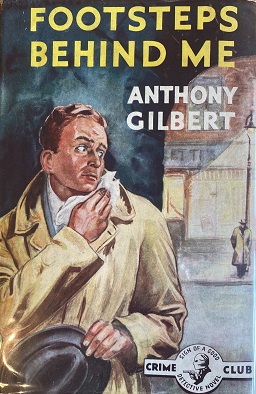
Footsteps Behind Me is a 1953 mystery detective novel by Anthony Gilbert, the pen name of British writer Lucy Beatrice Malleson. It is the twenty seventh in her long-running series featuring the unscrupulous solicitor and detective Arthur Crook. Crook first appeared during the Golden Age of Detective Fiction, but the series ran for several decades. It was published in the United States under the alternative title Black Death.
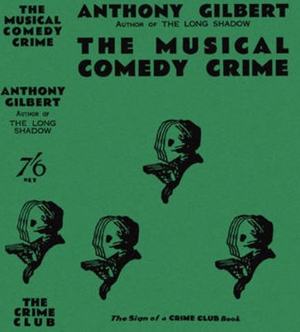
The Musical Comedy Crime is a 1933 mystery detective novel by Anthony Gilbert, the pen name of British writer Lucy Beatrice Malleson. It is the seventh entry of the series featuring Scott Egerton, her principal character before her better known creation Arthur Crook appeared three years later. A traditional whodunnit, it was published during the Golden Age of Detective Fiction.

The Tragedy at Freyne is a 1927 mystery detective novel by Anthony Gilbert, the pen name of British writer Lucy Beatrice Malleson, her first novel under the pseudonym. It introduced the amateur detective Scott Egerton, who was her principal character until the creation of Arthur Crook in Murder by Experts.

The Mystery of the Open Window is a 1929 mystery detective novel by Anthony Gilbert, the pen name of British writer Lucy Beatrice Malleson. It is the fourth novel in a series featuring her amateur detective, the politician Scott Egerton. Unlike the rest of the series it was published by Gollancz rather than Collins. It takes the form of a locked room mystery, a popular branch of the genre during the Golden Age of Detective Fiction.

The Man Who Was Too Clever is a 1935 mystery detective novel by Anthony Gilbert, the pen name of British writer Lucy Beatrice Malleson. It is the tenth and last in a series of novels featuring her amateur detective and politician Scott Egerton. The following year she introduced a new character, the unscrupulous solicitor Arthur Crook, in Murder by Experts.

Released for Death is a 1938 crime thriller novel by British writer, Henry Wade. Wade was a writer of the Golden Age of Detective Fiction, best known for his series featuring Inspector Poole. This was amongst a number of stand-alone novels he wrote. It has elements of an inverted detective story, rather than the traditional closed circle of suspects.

Sir John Magill’s Last Journey is a 1930 detective novel by the Irish writer Freeman Wills Crofts. It is the sixth in his series of novels featuring Inspector French, a prominent figure of the Golden Age of Detective Fiction. Much of the novel takes place in Northern Ireland, particularly around Belfast, where Crofts had spent a great deal of his younger years before moving to England. As with many of his puzzle mysteries its solution revolves around railway timetables as well as the possible distance a boat could cover in a certain time.
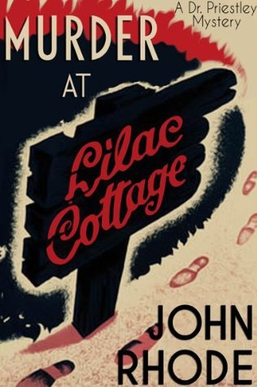
Murder at Lilac Cottage is a 1940 detective novel by John Rhode, the pen name of the British writer Cecil Street. It is the thirty third in his long-running series of novels featuring Lancelot Priestley, a Golden Age armchair detective. In the Times Literary Supplement reviewer Maurice Willson Disher noted "With both ingenuity and originality at command, he will keep puzzle-solvers guessing until it pleases Dr. Priestley to explain why clues are not what they seem." while Ralph Partridge gave it a broadly positive review in the New Statesman.
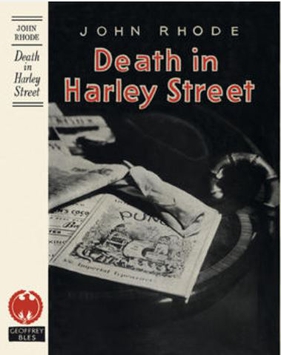
Death in Harley Street is a 1946 detective novel by John Rhode, the pen name of the British writer Cecil Street. It is the forty third in his long-running series of novels featuring Lancelot Priestley, a Golden Age armchair detective. Several sources consider it to be the author's masterpiece.

The Telephone Call is a 1948 detective novel by John Rhode, the pen name of the British writer Cecil Street. It is the forty-seventh in his long-running series of novels featuring Lancelot Priestley, a Golden Age armchair detective. It was published in America by Dodd Mead under the alternative title Shadow of an Alibi. It is based on the real-life Wallace Case of 1931 in which William Herbert Wallace was convicted of murdering his wife Julia, a conviction which was later overturned on appeal.

Family Affairs is a 1950 detective novel by John Rhode, the pen name of the British writer Cecil Street. It is the fifty first in his long-running series of novels featuring Lancelot Priestley, a Golden Age armchair detective. It was published in America by Dodd Mead under the alternative title The Last Suspect. It has been described as "probably the best post-war Rhode novel".

Murder in Crown Passage is a 1937 detective novel by the British writer Cecil Street, writing under the pen name of Miles Burton. It is the sixteenth in a series of books featuring the amateur detective Desmond Merrion and Inspector Arnold of Scotland Yard. Street was one of the most prolific authors of the Golden Age of Detective Fiction. It was published in the United States by Doubleday the same year under the alternative title The Man with the Tattooed Face. As often in the series, the setting is in rural England.
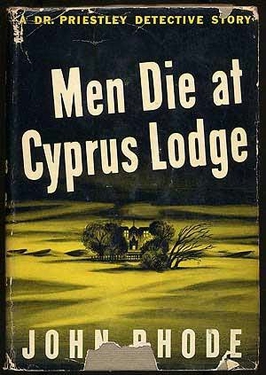
Men Die at Cyprus Lodge is a 1943 detective novel by John Rhode, the pen name of the British writer Cecil Street. It is the thirty eighth in his long-running series of novels featuring Lancelot Priestley, a Golden Age armchair detective. Reviewing it for the San Francisco Chronicle, Anthony Boucher wrote "at his best, nobody can touch Rhode for ingenious murder gadgets and very few can top him for meticulous unravelling; he's very close his best in this one".

Death at the Helm is a 1941 detective novel by John Rhode, the pen name of the British writer Cecil Street. It is the thirty fourth in his long-running series of novels featuring Lancelot Priestley, a Golden Age armchair detective. It makes reference to earlier stories in the series as the lawyer had defended in court the murderers Priestley had exposed in The Corpse in the Car and Death on the Boat Train. The characters in it were arguably more complexly drawn than in other books by the author.
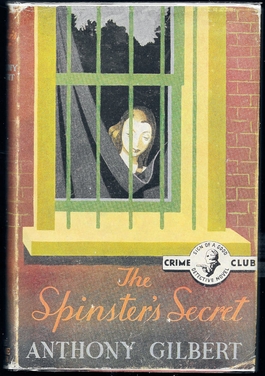
The Spinster's Secret is a 1946 mystery detective novel by Anthony Gilbert, the pen name of British writer Lucy Beatrice Malleson. First published in London by the Collins Crime Club it is the eighteenth in her long-running series featuring the unscrupulous London solicitor Arthur Crook, one of the more unorthodox investigators of the Golden Age of Detective Fiction. It was published in the United States by Barnes under the alternative title By Hook or By Crook.

Death in the Quarry is a 1934 detective novel by the British authors G. D. H. Cole and Margaret Cole. It was the twelfth in their series of novels featuring Superintendent Wilson, one of the many investigators of the Golden Age of Detective Fiction. It was published by the Collins Crime Club.




















